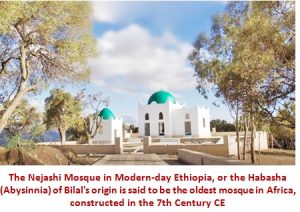Bilal, the Outrunner (Part-3)

Beginning with the previous two issues of Young Muslim Digest, the life of Bilal bin Rawaha, the famous Companion of the Prophet, is being serialized in this column every month. Presented herein under is the third installment in this series taken from the brief, but significant, biography by SYED IQBAL ZAHEER.
As stated earlier, we do not know the details of Bilal’s conversion to the new faith any further than what these two pieces of information convey: one, it was Abu Bakr who had taken him to the Prophet (saws) and two, he was one of the earliest, probably a couple of months after the Prophet (saws) received the first message … or more. He was so early a convert that once the Prophet (saws) told someone about his being a Prophet and then in reply to the man’s query about how many people did he have the credit of following him, he is reported to have said: “Two. A free man and a slave!” The free man was Abu Bakr and the slave was Bilal.
Now, we have earlier said that many of the qualities that Bilal displayed later, were taken straight from the Prophet. Self‑confidence was surely one. Consider the above story once again. The Prophet had just started his work. He was badly looking for followers. He had to be positive and paint a bright picture of things. He could have also said: “Well, you see, I have just started my work. And you know this kind of thing is slow in catching…” and so on. But he didn’t. He simply said: “Two. A free man and a slave!” Those words would have surely struck the man as steeped in self‑confidence.The whole episode, in Muslim (Salah al‑Musafirin), is quite interesting to read. We present one half of it here.
`Abasa al‑Sulami (he is the same person as `Anbasa), says: “In pre‑Islamic times, I strongly believed that my people, worshipping those idols, were entirely on the wrong. Then I heard that a man had appeared in Makkah who was giving news (of the other world). So I jumped on my mule and headed on to him. I discovered that he was the Messenger of Allah (swt), operating in secrecy and his people right upon him proving the better of him. So I entered Makkah carefully, unnoticed and presented myself to him. “Who are you?” I shot the question at him. “I’m a Prophet,” he replied. “And what’s a Prophet?” I asked. “Allah (swt) has sent me,” he said. “And what has Allah (swt) sent you with?” I enquired. “He has sent me with duty to the kindred, destruction of the idols, and that Allah (swt) be accepted as the only Lord,” he replied. “And who else is with you in this new faith?” I asked. “Two: a free man and a slave,” he replied. (He meant, I guess, Abu Bakr and Bilal as the believers in him until that time: narrator). “Well. I think I’ll follow you,” I said. “I don’t think you have the strength for it,” he told me. “Don’t you see my situation with my people. Rather, for the moment, return to your own people until when you hear of me as having overcome (the opposition). Then, at that time, you can come back to me.”
To continue with Bilal. There are some reports that would suggest that Bilal came into Islam much later than others: when the Prayers had already been prescribed. But it mustn’t be forgotten that the Prayers were prescribed right in the beginning. For instance, the following incident is reported by Ibn Kathir in his Al‑Bidayawa al‑Nihaya. His source is Ibn Jarir: “Yahya ibn `Afif says, ‘I visited Makkah in pre‑Islamic times and stayed with `Abbas ibn `Abdul Muttalib. The evening saw me visiting the Ka`ba when a young man appeared. He was staring at the horizon. When the sun went down he turned towards the Ka`bah and began to pray. It wasn’t too long when a boy appeared and stood besides him. And it wasn’t too long when a woman appeared and stood behind him. Then the young man bowed, and the boy and the woman bowed. The man rose up from the bow and the boy and the woman rose up too. Then the man prostrated himself and the boy and the woman prostrated themselves. I told `Abbas, ‘This is great.’ `Abbas said, ‘Yes. This is great. And guess who this man is?’ I said, ‘I can’t.’ He said, ‘He is Muhammad the son of `Abdullah: my brother’s son.’ Then he asked, ‘And do you know who that lad is?’ I said, ‘No.’ He said, ‘That’s `Ali the son of Abu Talib. And guess who the woman behind them is.’ I said, ‘I can’t again.’ He said, ‘That’s Khadeejah the daughter of Khuwaylid and wife of my brother’s son. And this man tells us that your Lord, the Lord of the worlds has ordered them to pray in the manner you see them doing now. And by God, in my knowledge, no one else follows this religion on this earth save for these three.’”
What is to be noted in this report is `Abbas’ words: “In my knowledge.” That is, `Abbas was speaking from his knowledge. But surely in those days not everyone announced of his Islam. So `Abbas’ knowledge could have been incomplete since it is widely believed that Abu Bakr was the first to believe and the first to Pray after the Prophet and Khadeejah.
Nevertheless, what is certain is that Bilal was the first of the slave population of Makkah and the first black to adorn himself with Islam. The order of acceptance of Islam, however, could have been as follows: The first woman to believe was Khadeejah. (She also holds the unbeatable record of being the first ever to believe). The first child to believe was `Ali: he was either nine or ten years of age at that time. The first free man to believe was Abu Bakr. The first freed slave to believe was Zayd b. Haritha. And the first slave to believe was Bilal. (And he too holds the unbeatable record of being the first African to believe, outrunning the blacks of all times).
The other piece of information that has come down to us in connection with Bilal’s conversion is that it was Abu Bakr who had introduced Bilal to the Prophet (saws). Abu Bakr was also responsible for the quick conversion of several others such as: Zubayribn al‑`Awwam, Uthman ibn `Affan, Talha b. `Ubaydullah, Sa`d b. Abi Waqqas, Abdul Rahman ibn `Auf, `Uthman ibn Maz`un, Abu `Ubaydah ibn al‑Jarrah, Abu Salamah, Al‑Arqam ibn Abi al‑Arqam … all prize catches if you wish to say. In this, Abu Bakr holds a record that is unbeatable too. Of the ten given the glad tiding of Paradise during their life‑time, six were converted by Abu Bakr! Ibn Sayyid Al‑Nas has given the name of all the early converts. See `Uyun al‑Athar.
Now with regard to Bilal’s conversion at the instance of Abu Bakr, this is something that needs to be probed. Abu Bakr was a tradesman and would have travelled a lot as one, both within the adjoining tribes as well as outside of the country. He had other interests, such as genealogy. This branch of knowledge, much respected by the purity conscious Arabs, would have required extensive travelling, and must have earned him much veneration. He knew so many people and with such details about them that perhaps they themselves didn’t. For instance, he knew about all the important people of the time, dead or alive, with details such as how was one related to various others within the clan and the tribe, and how were the clan and tribe members related to each other when their predecessors were lined up in a chart.
But genealogy was not everything Abu Bakr was known for, although that was enough for a man to be regarded well by his contemporaries. He was also a successful businessman, generous and upright. These qualities put him among the list of the aristocrats. Naturally he knew lots of well-placed people – one way or the other. Most of those that he was the cause of conversion to Islam would obviously have been friends of the ‘inner circle.’
Where does Bilal fit in this line up? He doesn’t. He was neither a tribal chief, a tradesman, an aristocrat, nor a poet. The mere fact that Abu Bakr had taken residence in the quarters of Banu Jumah does not explain everything. The information about Abu Baker taking up residence among the Banu Jumah is from Martin Lings. I could not locate the original source. That does not speak of close company. How did Abu Bakr know him and why did his eyes rest on Bilal as one who could be relied upon at a time when the instructions were to conceal the new faith and not divulge to anyone who, instead of embracing it, could make it the topic of public talk and evoke undue concern?
 Obviously Bilal meets with one condition. Abu Bakr knew him as not only a trustworthy person, but also as one of noble nature who would respond positively. Otherwise he wouldn’t have opened his heart to him. And to know him that way, he would have known him well, and for long. For trustworthiness is a quality ascribed late to the individuals. Perhaps, again, he knew him through trade. Maybe they had travelled together in the same caravans that went up to Syria and other Middle‑eastern Arabian regions. In the town too, Bilal might have often gone to Abu Bakr to conduct transactions for his master. Personal contacts would have led them to liking each other: after all they had so many things in common, intrinsically, if not so much extrinsically. When the hearts meet, social criteria melt away.
Obviously Bilal meets with one condition. Abu Bakr knew him as not only a trustworthy person, but also as one of noble nature who would respond positively. Otherwise he wouldn’t have opened his heart to him. And to know him that way, he would have known him well, and for long. For trustworthiness is a quality ascribed late to the individuals. Perhaps, again, he knew him through trade. Maybe they had travelled together in the same caravans that went up to Syria and other Middle‑eastern Arabian regions. In the town too, Bilal might have often gone to Abu Bakr to conduct transactions for his master. Personal contacts would have led them to liking each other: after all they had so many things in common, intrinsically, if not so much extrinsically. When the hearts meet, social criteria melt away.
Yet we have no details of the ‘pre‑Islamic’ friendship of the fair, rich, aristocratic Arab Abu Bakr and the black, less‑than‑commoner, Abyssinian Bilal. But we know that both were of taciturn nature, both self‑concealing and self‑effacing, both self‑confident to the absolute degree, and hence, both indifferent to what the world would think of them. Obviously, with these qualities wrapped well around them as their cloaks, who could possibly disclose the inner details of their friendship?
A Personality Is Born
So it was one God with Bilal now.
But is that all that is to the religion of Islam?
Surely not, even if that is the main point, the whole theme and at the center of all else that concerned Bilal.
Bilal would have learned from the Prophet that the communications he received from God were not for him alone, nor for the priestly class, nor yet for the elite, and surely not of the kind about which Bernard Shaw had said, “This Book should be kept safely locked in a drawer, away from the reach of the children.” Shaw is reported to have said that about the Bible. They were as much for Bilal. They were, in fact, Bilal’s own: a personal Book, as everyone else’s personal Book who acknowledged its truth. The messages had a special meaning for everyone who looked into them, even for those, in fact, that did not believe in it. It was like a lake. All could draw from it: each according to his need, capacity, taste and ambition. Some drew water. Others profited from the marine life. Yet others dived in and brought out pearls. And there were no limits. The ever expanding lake had a spring and a rich bed beneath it. The more you drew, the more it yielded. That, Bilal would have discovered, was the Qur’an.
The Prophet encouraged everyone to draw from it … directly … for himself. He even discouraged that they should seek its meaning from him, not unless it was something very unclear, and something on which depended their conduct. Otherwise they were to make the best they could of it through their own reasoning. And for the most part the message was plain and clear. It wasn’t ambiguous at all, not, at least, for those clear-headed sons of the desert that hadn’t been bombarded with philosophies, that give little by way of reason, but take away more by way of common sense. So Bilal didn’t have to refer to others for its meaning.
 Therefore, Bilal must have also drawn … and drawn heavily … if we are to judge by his attitudes and behavioral pattern in the coming years. He would have known that there was more to Islam than Prayers or remembrance of God, important as they were.
Therefore, Bilal must have also drawn … and drawn heavily … if we are to judge by his attitudes and behavioral pattern in the coming years. He would have known that there was more to Islam than Prayers or remembrance of God, important as they were.
Islam was addressing life and its situations. It was dealing with the real world. No. It wasn’t utopian at all. It was down to earth. And what’s more, it did not address a particular class of people. Whatever you were, rich, poor, educated, illiterate, commoner, aristocrat – just whatever – the Qur’an was there telling you things you hadn’t known before: things that made life meaningful, brighter, and, satisfying.
(To be continued)

